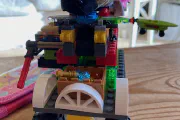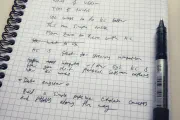2026
-
 23 Jan 2026 Interacting with Developers on RedditDevRel
23 Jan 2026 Interacting with Developers on RedditDevRel
2025
2023
-
 19 Jul 2023 Blog Writing for DevelopersDevRel
19 Jul 2023 Blog Writing for DevelopersDevRel -
 23 May 2023 What Does This DevEx Engineer Do?devrel
23 May 2023 What Does This DevEx Engineer Do?devrel
2022
-
 09 Dec 2022 Looking Forwards, and Looking BackwardsCareer
09 Dec 2022 Looking Forwards, and Looking BackwardsCareer -
 DevRel
DevRel
-
 31 Aug 2022 ⚡️ Writing an abstract for a lightning talk ⚡️DevRel
31 Aug 2022 ⚡️ Writing an abstract for a lightning talk ⚡️DevRel -
 DevRel
DevRel
-
 07 Apr 2022 Remote-First Developer AdvocacyDevRel
07 Apr 2022 Remote-First Developer AdvocacyDevRel -
 07 Apr 2022 Hanging up my Boarding Passes and Jetlag…for nowDevRel
07 Apr 2022 Hanging up my Boarding Passes and Jetlag…for nowDevRel
2020
-
 DevRel
DevRel
-
 02 Dec 2020 My Workstation - 2020DevRel
02 Dec 2020 My Workstation - 2020DevRel -
 Go
Go
-
 13 Mar 2020 Are Tech Conferences Dead?DevRel
13 Mar 2020 Are Tech Conferences Dead?DevRel -
 DevRel
DevRel
2019
-
 19 Sep 2019 Staying sane on the road as a Developer AdvocateDevRel
19 Sep 2019 Staying sane on the road as a Developer AdvocateDevRel -
 DevRel
DevRel
-
 19 Mar 2019 Quick Thoughts on Not Making a Crap Slide Deckpresenting
19 Mar 2019 Quick Thoughts on Not Making a Crap Slide Deckpresenting -
 01 Mar 2019 Preparing a New Talkpresenting
01 Mar 2019 Preparing a New Talkpresenting -
 09 Feb 2019 Travelling for Work, with Kids at Homepersonal
09 Feb 2019 Travelling for Work, with Kids at Homepersonal
2018
-
 19 Dec 2018 Quick Thoughts on Not Writing a Crap AbstractDevRel
19 Dec 2018 Quick Thoughts on Not Writing a Crap AbstractDevRel
